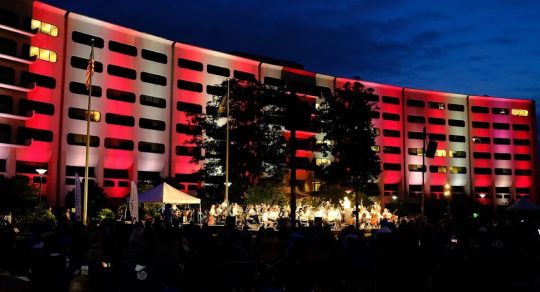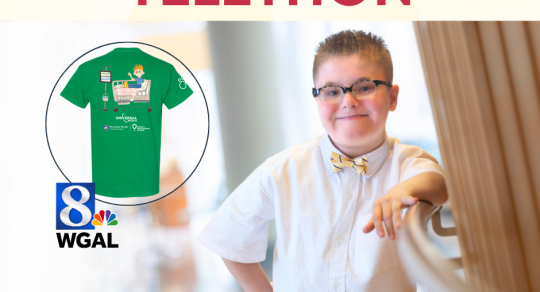Fellowship
Child Abuse Pediatrics
The Child Abuse Pediatrics Fellowship at Penn State Health Milton S. Hershey Medical Center is a three-year, ACGME-accredited program that admits one fellow every three years.
Explore More
The Child Abuse Pediatrics Fellowship at Penn State Health Children’s Hospital is structured to provide pediatric physicians with exceptional preparation for careers in child abuse pediatrics. Upon graduation, fellows are prepared to succeed in any setting, whether they have chosen advanced training, academic medicine or community-based practices such as Children’s Advocacy Centers.
The Center for the Protection of Children (CPC) is one of the foundational centers in Penn State’s Network on Child Maltreatment Solutions.

Program Overview
CPC includes the clinical work of child abuse pediatricians through the child protection team based at Penn State Health Milton S. Hershey Medical Center. Penn State Health Children’s Hospital is a Level 1 pediatric trauma center for the region of central Pennsylvania. Its inpatient consultations provide a wide variety of clinical experiences. Additionally, the Transforming the Lives of Children (TLC) Research and Treatment Center provides evidence-based mental health services and has been the core of the program’s research mission.
The fellowship’s academic program allows for the combination of a close-knit, personalized experience within all that an academic medical center has to offer. Program faculty members are board-certified child abuse pediatricians, including one board-certified in both child abuse pediatrics and pediatric emergency medicine, and a highly experienced general pediatrician. There is also a robust clinical and administrative support staff.
The group’s physicians staff the National Children’s Alliance-accredited Children’s Advocacy Centers in Harrisburg and Lebanon, Pa., UPMC Pinnacle Children’s Resource Center. At those sites, there are additional experienced nurse practitioners who also support the clinical mission.
During the Child Abuse Pediatrics Fellowship at Penn State, trainees develop a solid foundation of medical knowledge, including injury biomechanics, neurology, neurosurgery, radiology, neuroradiology, ophthalmology, trauma surgery, physical and sexual abuse. The team works closely with Child Protective Services, law enforcement and multidisciplinary teams in all surrounding counties.
Fellows will encounter and treat a wide spectrum of child abuse conditions, accidental mechanism and mimickers of abuse. Fellows will learn to provide evidence-based evaluation and treatment strategies within a family-centered care model. Child abuse pediatrics attending staff will support the fellow throughout this journey with one-on-one mentoring and supervision, allowing for increased independence as the trainee’s skills progress. By graduation, the program’s goal is for the fellow to have built upon a foundation of knowledge such that they can thoroughly and thoughtfully approach each individual patient they will encounter, skilled and eager to provide world-class and compassionate pediatric care.
Learn More about the Fellowship
Dear aspiring fellow,
The Child Abuse Pediatrics Fellowship is based at Penn State Health Milton S. Hershey Medical Center and Penn State Health Children's Hospital, serving a population of 3 million with the only Level 1 pediatric trauma center in central Pennsylvania.
The Children's Hospital has a full range of pediatric specialties and eight additional subspecialty fellowships, with a robust pediatric inpatient consultation service that includes the entire range of child abuse evaluation cases.
Penn State's Transforming the Lives of Children Clinic offers a medical home for children in out-of-home placement and a clinic dedicated to evidence-based treatment of children traumatized by abuse or neglect, who have sexual behavior problems or whose parents need parenting skills.
Penn State Health provides medical oversight for the region's NCA-accredited Child Advocacy Center, UPMC Pinnacle Health Children's Resource Center (CRC) in Harrisburg, with a satellite in Lebanon, Pa. The CRC provides forensic assessment for sexual abuse and some physical abuse for a seven-county region and has an annual volume of 1,200 referrals per year and 800 medical assessments.
Many opportunities exist for community education and involvement, participation on multidisciplinary, child fatality and medical/legal teams. Close collaboration with the Dauphin County coroner's office provides an opportunity to participate in death scene, autopsy and fatality review. The Division of Child Abuse Pediatrics is recognized as both the clinical and research hub for child maltreatment for Penn State, and the Center for the Protection Children at Penn State Health is one of the four foundational centers for Penn State's Network on Child Protection and Wellbeing, which includes Penn State Dickinson School of Law in Carlisle, Pa., the Pierce Prevention Center and the Child Study Center (both in State College, Pa.).
A robust cross-campus research initiative supports a range of clinical and basic science research opportunities. The fellow will have an opportunity to obtain the Master of Public Health degree through the Department of Public Health Sciences, located on campus.
I invite you to explore this website to find out more about the Child Abuse Pediatrics Fellowship at Penn State Health Children's Hospital. I am exceptionally proud of our program and of the skilled, insightful, compassionate child abuse pediatricians who provide teaching and preparing a candidate to become well-prepared for their successful careers. Our program is one of two CAP fellowships in PA and one of five CAP fellowships in the Northeast. Our fellows are able to experience a broad array of clinical presentations in an academic children's hospital. We get to know our fellows well and work with them closely, tailoring their educational experience based on their interests, skills and career aspirations.
As a fellow in our program, we will challenge you to be clinically outstanding, community-engaged, intellectually curious and, of course, to begin teaching what you learn to the next generation.
Please don't hesitate to contact me with any questions, and we look forward to working with you.
-Lori D. Frasier, MD Program Director, Child Abuse Pediatrics Fellowship
General Application Information
The Penn State Child Abuse Pediatrics Fellowship participates in the National Residency Matching Program (NRMP) Pediatric Subspecialties Match, with one fellowship spot per year.
All application materials must be submitted through the Electronic Residency Application Service (ERAS) for fellowship applicants. Applicants are encouraged to complete their applications as soon as possible once ERAS opens for the season.
Eligibility
Applicants must have completed an ACGME-accredited residency in pediatrics or medicine/pediatrics prior to the fellowship start date.
Applicants must be board-eligible or board-certified in general pediatrics by the American Board of Pediatrics.
Applicants must be eligible for or hold a Pennsylvania medical training license or medical license.
Applicants must be U.S. citizens, permanent residents or J-1 visa holders (no additional visa types are institutionally sponsored). The J-1 visa application process and fees are the applicant’s responsibility.
International medical graduates must hold a currently valid certificate from the Educational Commission for Foreign Medical Graduates (ECFMG).
Application Requirements
A complete ERAS fellowship application must contain:
Personal statement
Curriculum vitae
Letters of recommendation: At least three letters of recommendation must be included from faculty members with whom the applicant has worked; it is recommended that at least one letter be included from the applicant's residency program director
Dean's letter
Medical school transcripts
USMLE/COMLEX transcripts
For international medical graduates, ECFMG certification is required as part of the application.
Application Review Process
All applications are reviewed in their entirety. There is no official limit for the number of USMLE or COMLEX examination attempts or official board score "cutoffs;" however, the number of times the exam has been taken and board scores may impact the strength of an application.
All applications are considered without regard to race, religion, national origin, sex, gender, orientation, disability or family status.
Applications will be reviewed by the internal Fellowship Application Review Committee on a rolling basis once the ERAS application is complete. Qualified applicants will be invited for an interview. It is advisable to respond to an interview application as soon as possible, as interview dates are limited and may fill quickly.
Interviews
Interview days are conducted on Tuesdays when possible, which allows applicants the opportunity to attend the weekly, multidisciplinary Child Protection Team case conference. The more formal part of the interview day follows, consisting of individual interviews with the program director, program faculty (including the division chief and a subspecialty partner such as trauma surgery, neurosurgery or emergency medicine, schedule permitting).
Applicants with specific interests within child abuse pediatrics should describe those when scheduling an interview date such that the day can be structured accordingly.
A commitment to teaching
The Center for the Protection of Children at Penn State Health has attracted and cultivated an outstanding faculty team, many with special interests that serve as a focus for their teaching and research endeavors. Faculty members hold positions on various national committees and boards of national societies.
Current Fellows

PGY-6 Fellow, Child Abuse Pediatrics Fellowship

PGY-4 Fellow, Child Abuse Pediatrics Fellowship
Leadership


Program Coordinator, Pediatric Fellowships, Pediatrics

Program Coordinator, Pediatric Fellowships, Pediatrics
Supporting Your Training
Curriculum Details
The Penn State Health Child Protection Team developed an integrated curriculum that reflects the daily practice of a child abuse pediatrician.
For example, in the first year, during the week, the fellow has a protected research day to begin to jump-start research ideas. Fellows also spend a continuity day at the Children's Center with multidisciplinary team meetings as well as observation of forensic interviews, followed by a medical assessment. The remainder of the time is spent in inpatient consultation, as well as outpatient clinical appointments as required for hospital follow-up appointments and more urgent outpatient appointments.
A single consultation can entail the interaction of trauma surgery, neurosurgery, ophthalmology, radiology, neuroradiology and other specialists, resulting in a real-life integrated curriculum. Specific, separate elective weeks are provided to increase the depth of knowledge in radiology, neuroradiology, ophthalmology, forensic pathology and other interest areas of the fellow. Elective clinical time is counted the overall clinical allocation.
The fellow takes call from home one in four weekdays and one weekend per month, with appropriate holiday call.
In the second and third years, research time increases to allow the fellow to have more time to pursue research ideas and projects.
Four weeks of vacation are allocated per year. Generous CME support from the program, as well as from the institution, is available so the fellow can quickly become acquainted with national organizations and scientific meeting opportunities. Program-supported CME is dependent upon the fellow’s progress through their research program and opportunities to present at scientific meetings.
Year 1
Inpatient service consultation/electives - 60%
Children's Resource Center continuing care experience - 20%
Research - 20%
Year 2
Inpatient service consultation/electives - 40%
Children's Resource Center continuing care experience - 20%
Research - 40%
Year 3
Inpatient service consultation/electives - 30%
Children's Resource Center continuing care experience - 20%
Research - 50%
Fellow Core Curriculum Series
The Fellow Core Curriculum Series is a set of structured two-hour didactic sessions occurring on the second Monday of each month.
This innovative learning program provides instruction ranging from a core knowledge of research methodology - including research study design, research ethics, grantsmanship, manuscript writing and basic statistical analysis - to topics such as maintaining physician wellness, CV editing and negotiating employment agreements.
This is treated as protected time during which fellows are free of clinical duties.
Conferences
Pediatric grand rounds (every Tuesday, 60 minutes)
Child Protection Team case review (every Tuesday, one hour)
Journal Club (bimonthly on Tuesdays, one hour)
Division meeting (monthly on Tuesdays, one hour)
Multidisciplinary team meeting (bimonthly on Wednesdays, one hour)
Trauma program quality review (second Friday of each month, one hour)
CPT interdisciplinary review (second Friday of each month, one hour)
Fatality/near-fatality review by county (monthly on Fridays, one hour)
ECHO-CAP didactics (every Friday, one hour)
Elective time is typically available during all years of fellowship. The inpatient consulting service provides a wide range of opportunities to interact with specialties.
International and community engagement opportunities, including a global health elective, are possible depending on availability and opportunity.
All fellows participate in a one-week research introduction course through the Kempe Center at the University of Colorado. The course provides five days of introduction to research methods development of scholarly activities by the fellow.
Registration, travel and meal costs are covered by scholarships from the Kempe Center.
Contact Information
Mailing Address
Penn State Health Children's Hospital
Child Abuse Pediatrics Fellowship
Attn: Heather Matthews-McCormick
500 University Dr., P.O Box 850
Mailcode H085
Hershey, PA 17033
General Contact Information
Phone: 717-531-5458
Email: hmccormick@pennstatehealth.psu.edu
CPC Contact information
Lori D. Frasier MD, FAAP
Director, Center for the Protection of Children
500 University Dr., P. O. Box 850
Hershey, PA 17033
Phone: 717-531-5158
Fax: 717-531-0370



